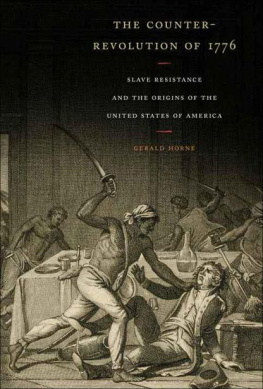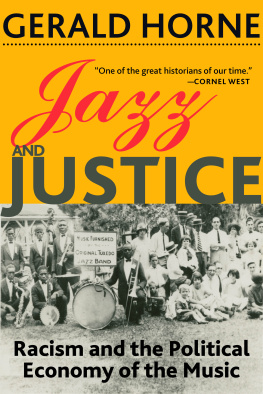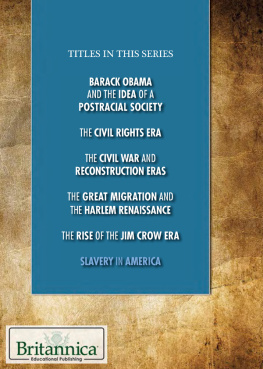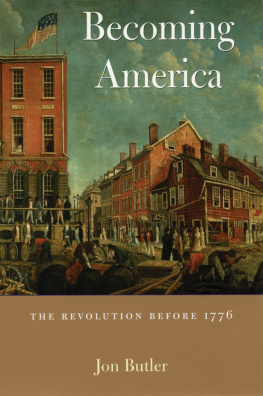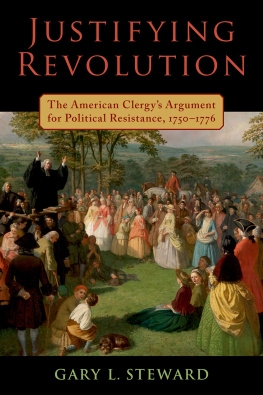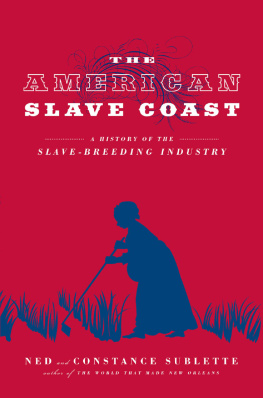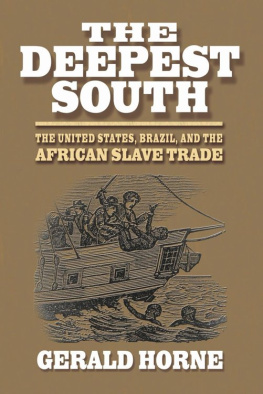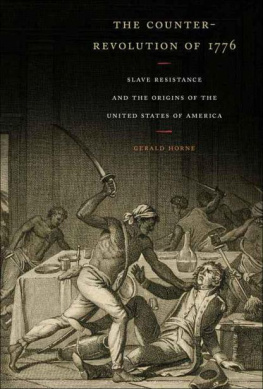Horne - The Counter-Revolution of 1776: Slave Resistance and the Origins of the United States of America
Here you can read online Horne - The Counter-Revolution of 1776: Slave Resistance and the Origins of the United States of America full text of the book (entire story) in english for free. Download pdf and epub, get meaning, cover and reviews about this ebook. City: États-Unis, year: 2016, publisher: New York University Press, genre: Romance novel. Description of the work, (preface) as well as reviews are available. Best literature library LitArk.com created for fans of good reading and offers a wide selection of genres:
Romance novel
Science fiction
Adventure
Detective
Science
History
Home and family
Prose
Art
Politics
Computer
Non-fiction
Religion
Business
Children
Humor
Choose a favorite category and find really read worthwhile books. Enjoy immersion in the world of imagination, feel the emotions of the characters or learn something new for yourself, make an fascinating discovery.
- Book:The Counter-Revolution of 1776: Slave Resistance and the Origins of the United States of America
- Author:
- Publisher:New York University Press
- Genre:
- Year:2016
- City:États-Unis
- Rating:5 / 5
- Favourites:Add to favourites
- Your mark:
- 100
- 1
- 2
- 3
- 4
- 5
The Counter-Revolution of 1776: Slave Resistance and the Origins of the United States of America: summary, description and annotation
We offer to read an annotation, description, summary or preface (depends on what the author of the book "The Counter-Revolution of 1776: Slave Resistance and the Origins of the United States of America" wrote himself). If you haven't found the necessary information about the book — write in the comments, we will try to find it.
Horne: author's other books
Who wrote The Counter-Revolution of 1776: Slave Resistance and the Origins of the United States of America? Find out the surname, the name of the author of the book and a list of all author's works by series.
The Counter-Revolution of 1776: Slave Resistance and the Origins of the United States of America — read online for free the complete book (whole text) full work
Below is the text of the book, divided by pages. System saving the place of the last page read, allows you to conveniently read the book "The Counter-Revolution of 1776: Slave Resistance and the Origins of the United States of America" online for free, without having to search again every time where you left off. Put a bookmark, and you can go to the page where you finished reading at any time.
Font size:
Interval:
Bookmark:
THE COUNTER-REVOLUTION OF 1776
Slave Resistance and the Origins of the United States of America
Gerald Horne

NEW YORK UNIVERSITY PRESS
New York and London
www.nyupress.org
2014 by New York University
All rights reserved
References to Internet websites (URLs) were accurate at the time of writing. Neither the author nor New York University Press is responsible for URLs that may have expired or changed since the manuscript was prepared.
Library of Congress Cataloging-in-Publication Data
Horne, Gerald.
The counter-revolution of 1776 : slave resistance and the origins of the United States of America / Gerald Horne.
pages cm
Includes bibliographical references and index.
ISBN 978-1-4798-9340-9 (hardback)
1. Antislavery movementsUnited StatesHistory18th century. 2. United StatesHistoryRevolution, 1775-1783Social aspects. 3. SlaveryUnited StatesHistory18th century. 4. African AmericansHistoryTo 1863. I. Title.
E446.H83 2014
973.31dc23 2013043412
New York University Press books are printed on acid-free paper, and their binding materials are chosen for strength and durability. We strive to use environmentally responsible suppliers and materials to the greatest extent possible in publishing our books.
Manufactured in the United States of America
10 9 8 7 6 5 4 3 2 1
Also available as an ebook
It was January 2012 and I was ecstaticand with good reason.
I had been working on the book at hand for some time and had traveled extensively. However, building renovations had prevented my access to the New York Historical Society in Manhattan until my tardy arrival in early 2012. However, as it turns out, my wait was rewarded amply when I encountered the richly informative Daniel Parish, Jr. Slavery Transcripts, which cover extensively colonial slavery in North Americaand beyond.
For it is the argument of this book that slavery permeated colonial North America, underpinning the pre-1776 economy, in terms of not only agriculture but insurance, banking, shipbuilding, and the like. Yet the enslaved resisted fiercely, as we will see, and did so quite often, at times with the aid of competing colonial powers, notably Spain and, to an extent, France. Their resistance helped to drive settlers from the Caribbean to the mainland, particularly in the years leading up to 1776. The sprawling land mass of the mainlandversus the limited land mass of the Caribbeanallowed European empires to more easily bump into one another, for example, on the Georgia-Florida border, causing sparks to fly.
The crucial turning point for North Americaand arguably, the British Empire as a wholeemerged in 1688 with the so-called Glorious Revolution, which, inter alia, caused the monarchy to retreat and led to the ascendancy of a rising class of merchants. This, in turn, to the detriment of the Royal African Company. These entrepreneurs descended maniacally upon Africa, igniting a quantum leap in the slave trade which at once developed immensely the economy of the Americasand, likewise, engendered ever more angry resistance from the enslaved, causing ever more anxious settlers to migrate to the mainland. The year 1688, with its simultaneous launching of vast economic transformationparticularly in North Americaand a riotous instability driven by enslavement, is the hinge moment in the creation of what is now routinely referred to today as modernity.
As the economy developed on the mainland, thoughts of independency grew accordinglyalong with slave resistance. The latter was manifested most dramatically in Manhattan in 1712 and 1741 and South Carolina in 1739. It is an error to view the history of colonial British North America as simply pre-U.S. history in a teleological manner. It is likewise useful to integrate events in the Caribbean into our contemplation of the mainland. Though Londons provinces in the Americas may not have been wholly unitary, it remains true that North Americans had been trained to regard the southern mainland colonies as part of an extended Caribbean region that was a primary source of wealth. Put simply, London realized that massive slave uprisings in Jamaica and Antigua, most particularly, could portend the collapse of the Caribbean colonial project as a whole, as Africans strained to assert themselves forcefully, if not rule altogether: such rebelliousness made London more susceptible to sweet reasonand, ultimately, abolitionas it considered the further expenditure of blood and treasure that could have gone to bolster British India or territories elsewhere. At the same time, slave rebelliousness caused settlersparticularly on the mainlandto dig in their heels, hastening the split between province and metropolis.
This slave resistance was aided immeasurably not only by the indigenous but also, as noted, by competing colonial powers. As London jousted with Madrid in the Americas, both came to rely upon armed Africans, and this crucial factor, along with the substantial resources that had to be expended in order to maintain a slave system, inexorably helped to spur a nascent abolitionist movement. Increasingly, the development of the economy on the mainlandincluding the ability to engage in mutually profitable trade arrangements with French settlers in Hispaniolaalong with apprehension about the presumed anti-slavery tendencies of the British Crown, evidenced by the notorious edict of Lord Dunmore in November 1775 in Virginia, helped to push the colonists into open revolt by 4 July 1776.
Though it may be hard to imagine at this late date, my conclusion in this book is that many Africans had different plans for the destiny of colonial North America that decidedly did not include a starring role by the now famed Founding Fathers and their predecessors but, instead, contemplated a polity led by themselves in league with the indigenous and, perhaps, a compliant European power. As such, the ongoing persecution of descendants of mainland enslaved Africans isin parta continuing expression of what tends to befall those who are defeated in bloody warfare: often they are subjected to a heinous collective punishment.
In essence, simply because Euro-American colonists prevailed in their establishing of the U.S., it should not be assumed that this result was inevitable. History points to other possibilities, and contemplating them may shed light onat leastwhy Africans suffered so grievously in the aftermath of the founding of the republic: strikingly, as London was moving toward abolition, the republic was supplanting the British isles as the kingpin of the global slave trade.
Hence, this book diverges sharply from the consensus view of the origins of the post-1776 republica view which has united a stunningly diverse array of scholars.deficit of trust between Africans and Europeans. Portraying the Africans as bit players supporting a revolt in 1776 dominated by Europeansas the uplifting narrative tends to donot only distorts and caricatures the historical record but also obscures a trust deficit that may still be of relevance today.

Hence, 1688 gave rise to a cousins war in the Americas in the face of perpetual sedition and liquidation plots from this rambunctious labor force. However, this was an exceedingly elongated process that took decades to lurch toward a sort of justice in 1865 (or, perhaps, 1888a precise two centuries after the tumult in Londonwith abolition in Brazil).
To the extent that 1776 led to the resultant U.S., which came to captain the African Slave Tradeas London moved in an opposing direction toward a revolutionary abolition of this form of propertythe much-celebrated revolt of the North American settlers can fairly be said to have eventuated as a counter-revolution of slavery.
Next pageFont size:
Interval:
Bookmark:
Similar books «The Counter-Revolution of 1776: Slave Resistance and the Origins of the United States of America»
Look at similar books to The Counter-Revolution of 1776: Slave Resistance and the Origins of the United States of America. We have selected literature similar in name and meaning in the hope of providing readers with more options to find new, interesting, not yet read works.
Discussion, reviews of the book The Counter-Revolution of 1776: Slave Resistance and the Origins of the United States of America and just readers' own opinions. Leave your comments, write what you think about the work, its meaning or the main characters. Specify what exactly you liked and what you didn't like, and why you think so.

